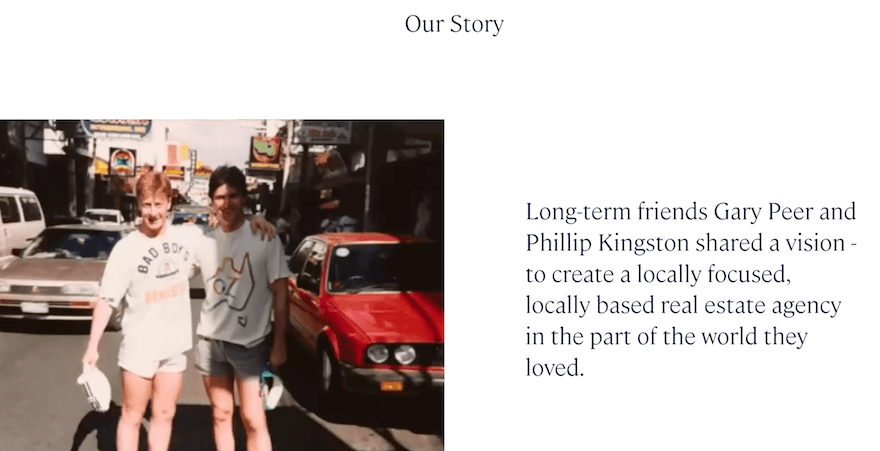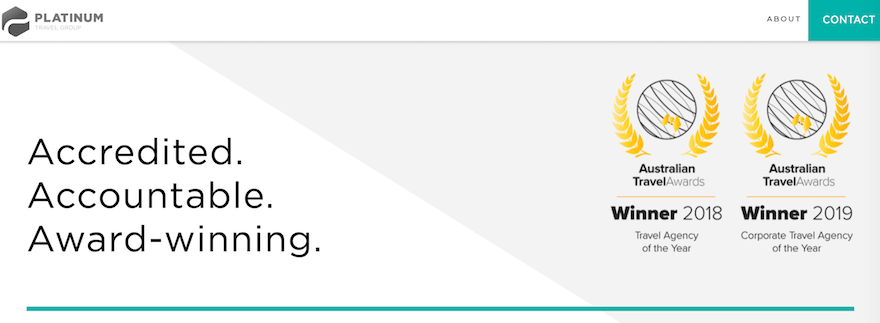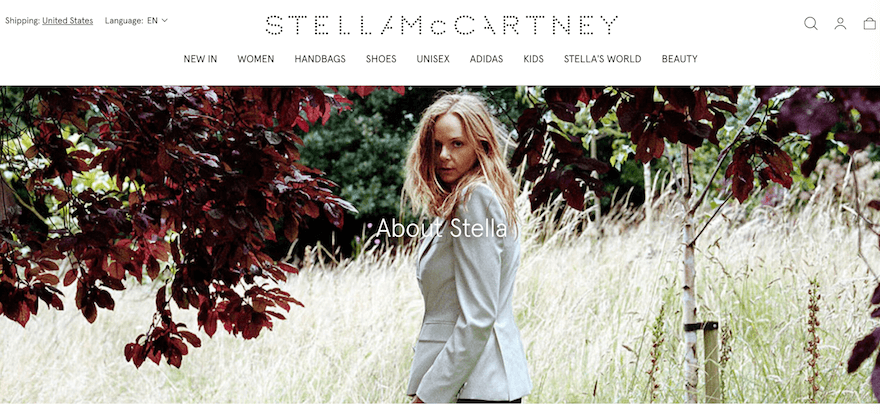‘About Us’ Page Guide for Local Businesses: Tips, Tricks & Examples
If you click to purchase a product or service based on our independent recommendations and impartial reviews, we may receive a commission. Learn more
So far, your local business website is coming along nicely. You’ve started building your website, are getting a handle on the design, and it’s starting to come together.
Then you hit a snag. Sighing deeply and gesticulating despairingly at the sky, you ask yourself – “just how do I write an “About Us” page, exactly?”
It’s a difficult question – but it’s one you’re in the right place to answer.
Below, we’re explaining what an “About Us” page is, and what information your local business should include on it. Then, we’ll unveil our top nine strategies for creating an “About Us” page that will resonate with your local audience – and provide a couple of “About Us” examples for small businesses from companies with captivating, compelling online presences.
Sound good? Let’s kick things off.
What Is an About Us Page?
An “About Us” page is an essential feature of your business website.
It’s a place where you can provide information about your business; your chance to showcase not only what you do, but why you do it – and, most importantly, who you are.
Your “About Us” page should introduce your company, explain its history, mission, vision, and values, and shine a light on the incredible team that makes it all tick. An effective “About Us” page will establish trust with your audience, build up your credibility within your industry, and foster a connection with your potential and current customers – giving everyone that visits it a clear understanding of the people and principles behind your business.
What Should Local Businesses Include on an About Us Page?
Now you know what an “About Us” page is (and what a good one should do). But the question remains – what should you, as a local business, include on your website’s “About Us” page?
Well, while it’s important to remember that no two “About Us” pages will ever be the same – and no element is truly a non-negotiable – there are some good places to start.
These include information about:
- Your vision, mission, and values: why does your business exist, and what principles guide your operations? How will you turn your business dreams into reality?
- Your key people: introduce your founder, current owner, and key people. Talk about their background and qualifications, and what inspires them.
- Your USP (unique selling proposition): explain what sets your business apart from the competition. What value do your products and services offer that make you stand out?
- Your location and contact details: include the physical address of your business, its phone number and email address, as well as an interactive map to help searchers find you.
- The history of your business: create a timeline tracing the history of your business from when it was founded to today – recapping its biggest milestones and challenges along the way.
- Your client testimonials: got positive feedback from your customers? Showcase it!
Your “About Us” page should also contain important links to other pages on your website, as well as to your social media profiles. Needless to say, too, that it shouldn’t be a wall of text – so add in relevant photos and videos to make the page experience an engaging one!
More Information
- How to Use Local SEO: Don’t forget to optimize your pages for local SEO so you can target the right audience
How to Write an Effective About Us Page
From crafting your company’s narrative to honing your website’s aesthetics, let’s take a look at the nine key components of an effective “About Us” page in 2024:
1. Craft a Compelling Business Story
Everyone loves a good story – and your “About Us” page is the canvas on which to paint yours.
But where to begin? Well, at the beginning, of course! Start with the “why” behind your business and its creation. All good stories need a protagonist – so think about what inspired you or your founders to embark on the journey, what problem you were attempting to solve, and what values and principles shaped your earliest business decisions.
It’s not just heroes stories need, though – but obstacles, too. So note down the most significant challenges your business has faced. How did you overcome them? What did you learn from them?
To help you shape your brand’s underlying narrative, the StoryBrand framework will help. It’s a seven-part storytelling framework designed to help businesses uncover – and articulate – their core marketing messages. Successful websites have already been using StoryBrand to structure their “About Us” pages – and we’ve showcased our top StoryBrand website examples to get you inspired.

2. Showcase the Team
Your “About Us” page should never be just about your business, but the people propelling it. People, after all, don’t connect only with logos, or brand names, or colors, or web design – they connect with other people!
So put your staff in the limelight. Include a team photo, add individual bios of your employees, and don’t shy away from adding more personal details and showing off your expertise.

3. Local Roots and Community Engagement
As a local business, people want to support you. It feels good shopping locally, after all – like we’re giving something back to the community. Through that lens, however, you need to ensure you’re communicating to them that you are local – your “About Us” page is the perfect platform.
Your “About Us” page should highlight your local ties and involvement in your community at a grassroots level. Do you support, attend, or contribute to local events? How about charitable causes? Are there local partners you work with – suppliers, for instance – that you want to shine a light on? This is your place to do it.
4. Include Customer Testimonials and Reviews
Customer testimonials and reviews (ideally five-star ones!) are brilliant examples of what marketers call “social proof”. They build credibility with your audience, and engender trust by demonstrating to them that someone has already used your product or service.
To do this, first ask your customers for reviews by emailing them after they’ve made a purchase from your business. Then, it’s simply a matter of adding these customer testimonials to your website’s “About Us” page. That said, be selective – though it’s important to respond to negative reviews, you don’t want them cluttering up your “About Us” page.
5. Highlight Awards and Recognitions
Any awards and recognitions you’ve received all serve as powerful social proof, too – be it from your industry’s governing body, other businesses, or simply satisfied customers.
They show you’re respected by the other big players in your sector, and bestow vital credence and credibility upon your brand. So be sure to feature these prominently on your “About Us” page – although not so prominently that it seems boastful.
It’s a brag, sure – but it should be a humble one!

6. Align Products/Services With Local Needs
Remember tip #3, and the point it stressed about looking local? Well, that goes not only for your grassroots community involvement, but for your products and services – so be sure to target and tailor them to the specific demands of your local customers.
One example? McDonald’s. The global fast food giant has more than 36,000 restaurants in over 119 countries – yet it tailors the menu in each region to cater to local tastes.
Adapting your wares to your local market will increase your brand’s levels of relevance, and show you’re not merely paying lip service to local needs – but satisfying them too.
7. Sustainability and Responsibility Initiatives
The best “About Us” pages aren’t simply the ones that talk about the business alone, or even its people. They’re the pages that convey how that business fits into the wider world. That acknowledge their place as a piece of a broader puzzle, and recognize their commitments to concepts like corporate social responsibility (CSR) and ecological sustainability.
Your “About Us” page is your chance to talk about what you’re doing for the environment. Are you offsetting the carbon footprint caused by your business’s operations? Do you only work with sustainably sourced materials, or suppliers certified-free of sweatshop labor? How transparent is your supply chain – and do you practice ethical marketing?
If so, talk about it. If not, well… get onto it!
8. Visual Appeal and Design
As we noted earlier, “About Us” pages should never be dominated by text. In fact, many of the best stories are told not merely in words, but in pictures – which says a lot about the importance of adding high-quality images and videos to your website.
If you’re building your “About Us” page with a website builder, you’ll also want to make sure you’ve selected a visually appealing theme. These are preset templates which you can choose from at the beginning of your website-building journey. They speed up the design process and give you the professionally-rendered foundations upon which to build a beautiful website.

9. Regular Updates and Maintenance
Our final tip? That working on your “About Us” page should never stop.
It’s never something you simply complete, but an ongoing endeavor of maintenance, optimization, and iteration that evolves as your business does. So keep it updated as new staff onboard, new hurdles are vaulted, new (glowing) customer testimonials arrive, and new awards are bestowed upon your business.
About Us Examples for Small Businesses
Understanding the principles of a good “About Us” page – and the process with which you can put one together – is one thing. Putting them into practice is quite another – so before you get creating, you’ll want to browse some examples of “About Us” pages from the companies doing it best.
We already have a dedicated guide for that – with 15 of the best “About Us” page examples to inspire you – which we’d recommend checking out for the full rundown. But, for a quick bit of inspo to spark your imagination, we’ve also profiled the “About Us” pages of two local businesses below.
Talking Terror with Rob Binns
Talking Terror is Rob’s passion project – a place where he reviews the latest horror movies, as well as classic entries into the genre. Its “About Us” page is simple from a design standpoint: it sticks to a specific set of spooky colors (orange and black) and uses plenty of white space to help its bold typography stand out.
As for the copy, Talking Terror’s “About Us” page is written in a conversational, down-to-earth style which turns back time to trace Rob’s origins with the horror genre. Talking Terror’s “About Us” page also contains on-brand imagery to give readers more of a sense into Rob’s personality and character. It’s a good reminder that, while what you write on your “About Us” page is important, a picture says a thousand words – so don’t skimp on the visuals!

Hype Entertainment
Based in Wellington, New Zealand, Hype Entertainment is an immersive event design and production company. It uses a parallax scrolling effect, with an astronaut that moves as the user’s cursor does. With space debris floating along in the screen in the background, the effect is one of being lost, intoxicatingly, in space.
Though Hype’s “About Us” page is most notable for its design – but the copy is also crisp. It introduces Hype’s founder, Andy, before detailing the history of the business: including where it was founded, some of the awards it’s won, and its key players. It’s a snappy, succinct summary of the business that hooks the reader and tells them exactly what they need to know – without ever becoming overlong or boring.

Summary
In this guide, we’ve explained what an “About Us” page is, what information they should include, plus nine tips – and two examples – for creating yours.
Bear in mind, though, that what we’ve outlined here are guidelines, or strategies – not rules. That’s because creating an “About Us” page is a personal, individual process. It shouldn’t just describe your business, but the people behind it – their motivations, their passions, even their fallibilities. In that sense, the only rule when it comes to creating an “About Us” page that works for your local business is, well – that there are no rules!
So go forth, and don’t see creating your business’ “About Us” page as a chore, but as an opportunity. One to connect on a deeper level with your customers, attract new ones, and create an online presence you – and the other people that keep your local business ticking over – can be proud of.
Leave a comment